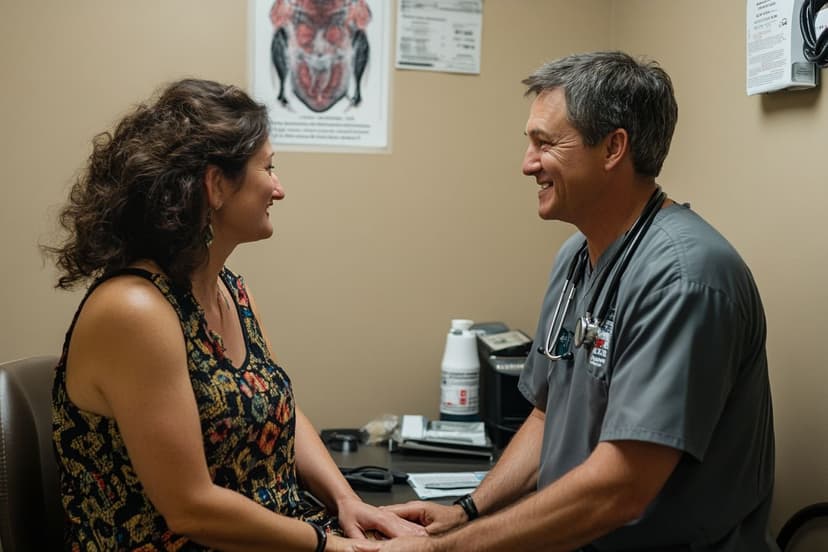Importance of Detecting Colon Cancer Early for Better Health Outcomes
Grace Turner • April 1, 2025 • 4 min
Understanding the early signs and symptoms of colon cancer is critical to ensuring timely intervention and effective treatment. Changes in bowel habits, such as persistent diarrhea or constipation, coupled with rectal bleeding, are significant indicators that should not be ignored. Recognizing these signs early can lead to improved outcomes, highlighting the importance of regular screenings and early detection methods.

Recognizing Early Signs and Symptoms
Understanding the early signs and symptoms of colon cancer is crucial for timely intervention. The most common indicators include persistent changes in bowel habits, such as diarrhea, constipation, or a change in consistency that lasts longer than a few days. Another significant sign is rectal bleeding or blood in the stool, which should never be ignored. While these symptoms might be attributed to less serious health issues, their persistence warrants professional medical evaluation.
Other symptoms to be aware of include persistent abdominal discomfort, such as cramps, gas, or pain, a feeling that your bowel doesn’t empty completely, and unexplained weight loss. Fatigue and weakness are also common, as colon cancer can lead to anemia due to chronic blood loss. It is crucial to listen to your body and seek medical advice if you notice any combination of these symptoms, especially if they are new or worsening over time.
Early detection of these symptoms can make a significant difference in the prognosis of colon cancer. For example, a study published in the Canadian Medical Association Journal found that individuals who recognized and reported symptoms early were more likely to receive treatment at a stage when the cancer was still localized, significantly increasing survival rates.
The Role of Regular Screenings
Regular screenings play a vital role in the early detection of colon cancer, especially for individuals over the age of 50 or those with a family history of the disease. Colonoscopy is considered the gold standard for colon cancer screening. It allows doctors to directly visualize the entire colon and rectum, remove polyps before they become cancerous, and take biopsies of suspicious areas.
Other screening methods include stool-based tests, such as the fecal immunochemical test (FIT), which detects hidden blood in the stool, and DNA stool tests that identify abnormal DNA associated with cancer or polyp cells. It's important to discuss with your healthcare provider which screening method is appropriate for you and how often you should be screened.
Screenings are not just about detecting cancer but also about preventing it. A report highlighted that regular screenings could prevent up to 60% of colorectal cancer deaths. This underscores the importance of adhering to recommended screening schedules.
Advances in Diagnosis Methods
In recent years, there have been significant advancements in colon cancer diagnosis, making early detection more accessible and accurate. Innovations such as virtual colonoscopy, also known as CT colonography, use CT scans to produce images of the colon and rectum, offering a less invasive option for those unable to undergo a traditional colonoscopy.
Molecular testing and genetic profiling are also becoming more prevalent. These tests can identify specific mutations in cancer cells, allowing for more personalized treatment plans. Liquid biopsies, which detect cancer cells or DNA in the blood, are emerging as promising tools for early detection and monitoring of cancer recurrence.
Moreover, artificial intelligence (AI) is increasingly being integrated into diagnostic processes, assisting in the analysis of colonoscopy images to improve accuracy and reduce the chance of missing polyps. These technological advancements are paving the way for earlier and more precise detection of colon cancer, ultimately leading to better patient outcomes.

Improving Outcomes Through Early Detection
Early detection and regular screenings are key in significantly impacting treatment success for colon cancer. Detecting cancer at an early stage often means that the cancer is smaller and hasn't yet spread, making it easier to treat. According to the Canadian Cancer Society, the five-year survival rate for localized colon cancer is over 90%, compared to only 14% for cancer that has spread to distant parts of the body.
Early detection also means that less aggressive treatments may be necessary, reducing the impact on a patient’s quality of life. For instance, localized cancers can often be treated with surgery alone, while advanced stages may require a combination of surgery, chemotherapy, and radiation therapy.
Real-life examples abound of individuals who have benefited from early detection. Take the case of a 55-year-old resident who, during a routine screening, had early-stage colon cancer detected and successfully removed with minimal intervention, allowing him to return to his daily routine swiftly.
Conclusion
In summary, understanding the importance of early detection and regular screenings for colon cancer cannot be overstated. By recognizing early symptoms, adhering to recommended screening guidelines, and staying informed about advancements in diagnostic methods, individuals can significantly improve their chances of successful treatment and survival. Remember, early action is crucial, and staying informed is the best defense against colon cancer. Always consult with healthcare professionals to determine the best approach for individual health needs. Discover more about how proactive steps can protect from colon cancer.
Disclaimer: All content, including text, graphics, images and information, contained on or available through this web site is for general information purposes only. The information and materials contained in these pages and the terms, conditions and descriptions that appear, are subject to change without notice.